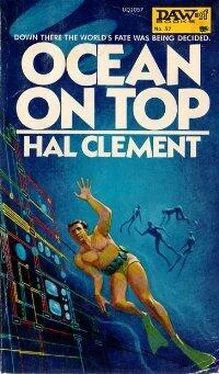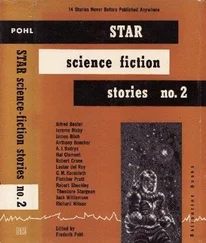He laid the pad under a chair — that’s not quite the right way to say it; the pad was denser than the liquid, so figure it out for yourself — and swam off. There seemed to be nothing to do but start reading.
Now, I don’t have copies of those books and tapes. And I know Bert was a liar. But take my word for it, there were far too many of them for him to have produced himself in the time he was down here. Most of them were handwritten, though some had been typed. I spent something like eighteen solid hours just skimming the ones that were in languages I knew. (I shouldn’t say solid hours. Bert did come back to take me to meals, and I also slept. There’s no point in describing all the details of life, even if the environment did make some of them rather unusual). I’ll boil down the picture I got of the situation to the smallest volume I can manage.
The place had indeed been in existence before the Board. During the final few decades before rationing, the separate political institutions which existed then were one by one coming to realize that man’s energy reserves were indeed vanishing. A number of frantic attempts were made to avoid, or at least postpone, the consequences without offending public opinion — or rather, without disturbing public complacency.
My own historical knowledge is shaky, but I seem to remember that this was the period of the ‘crash program’, which cynical engineers of the time used to define as an administrative attempt to produce a baby in one month by making nine women pregnant. You must know some of the results, like the Mediterranean-Dead Sea hydroelectric tunnel, the Messina, Key, Ore and Arafura dams, the Valparaiso thermocouple, the Bandung and Akureyr volcanic taps. Some worthwhile, and even valuable, some monuments to inept politics.
You know the further consequences of some of them — the disputes over output use which led to a dozen minor wars, which in turn wasted more energy in a year than all the crash units together could produce in a human lifetime. And you know that the final result was the formation of the Board and general acceptance of power rationing.
During the period of friction several nations attempted to set up secret power plants, in the hope either of avoiding the covetousness of their neighbors or of providing themselves with energy reserves in case violent conflict did occur. Most of these ‘secrets’ were secret only to the general public of the nation concerned long before they were producing — such of them as got that far. A few lasted for several years after Board rationing began. It had been assumed that the last of these had been found and tied into the general power net many decades ago.
But here was another.
It was as simple as that — almost.
I didn’t find in the records just what country was responsible. I didn’t try very hard. The name would have been almost as meaningless to me, born more than half a century after country names had become merely geographical labels, as it would have been to Abraham Lincoln, who died probably twice as long before the nation in question existed.
It was probably a small enough country to be worried about its neighbors, and certainly a large enough one to be highly industrialized. The technique of deep-sea living which was being so effectively demonstrated to me at this moment was not a product of casual, or even of crash-program, research. It must have involved a very long development period. Knowing something of the customs of the time, I’m still amazed that the secret was kept — though I can guess at the steps which in those days would have seemed normal and proper to achieve this end.
Anyway, they set up the station and had it running nicely before the Board and rationing became a reality.
Remember, it was a secret. It had to be. Only a handful of people would have known about it at any one time, other than the thousands of permanent residents. That handful, when rationing began and all power sources became public property, simply and quietly withdrew from the world and severed connections with it. A little ruthlessness may have been necessary, but I prefer to believe that the worst to happen was a little forced change of address.
At any rate, there was suddenly a new nation with a population of about fifteen thousand at the bottom of the Pacific. It was well supplied with manufacturing and synthesizing plants, and oversupplied with energy. Fifteen thousand people. As Marie put it later, fifteen thousand aristocrats — and more than fifteen billion Jacquerie.
More realistically, fifteen thousand cut flowers.
Most of the accounts I read expressed, or at least hinted, the belief that the severance of relations with the surface hadn’t been meant to be so complete. It must have been obvious to all concerned that a population of that size was far too small to maintain a highly technical culture and equally obvious that only a highly technical culture could live under those conditions. They presumably meant to maintain intellectual contact with the rest of mankind — probably they even meant to maintain physical connection, since it’s hard to believe that they expected to be able to manufacture every piece of equipment they needed to keep themselves going.
But they didn’t maintain those contacts. They couldn’t. They might possibly have managed, even in the face of the unexpected difficulty, if what contact there was didn’t have to be surreptitious; but the two factors together broke the link.
The unexpected difficulty might have been foreseen if the station had been running for more than a very few years before the break; there would have been some eye-opening experience. As it was, the experience came later.
A technical culture has to be a literate one, at least until some adequate substitute for the reference book can be devised. Did you ever consider the problem of teaching a phonetic language like Russian or English to someone who had never heard a spoken word and can’t produce a sound himself?
All right, I know it can be done by a highly trained specialist. What do you do, though, for the specialists needed when no one in the entire population can speak a word and you want to teach the new generation to read Farrington Daniel’s Mathematical Preparation for Physical Chemistry or some similar basic work? You’re not qualified yourself. All your neighbors are in the same boat. The kids themselves are playing around together, presumably communicating by signs of some sort, but what are the chances of the signs they’ve invented for themselves being useful for explaining elementary vector analysis? Even elementary discipline questions are hard enough to get across; in this medium it’s impossible to administer a decent spanking.
Still, you’ve got to produce a certain number of competent engineers and technicians with each generation, or the whole group is going to die in the darkness— and chill of the ocean bottom.
What you’d do I don’t know, but this group leaned heavily on pictures. I don’t know the details. There were differing versions in the books I read, and I suspect that many of them were guesses on the part of the writers. There must have been a lot of determination, some panic, a high general intelligence level and a certain amount of plain luck involved. As it came out in the end, the grandchildren of the original group had the use of a highly workable written language which must have evolved, just as I’d suspected when I saw it, from electrical and engineering diagrams — the sort of things where the connection between symbol and experience could be most easily shown to the growing children. The gesture language was a derivative of the written one, with gesture patterns standing for drawn symbols in much the way that our phonetic written languages are derivatives of the spoken equivalents. Think over the details yourself; I’m still incompetent.
Читать дальше












